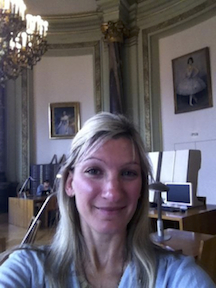By Melissa Immel
When Catherine A. Viano took a seminar on nontraditional classical plays, she began to wonder if the dramatic power of machine effects was fully understood in the body of scholarly work on seventeenth-century French theater.
She noticed that theater machines were used in multiple genres, but classical scholars had neglected to study the use of such machines. Why was no one writing about theater machines? Why were theater machines being overlooked or marginalized? These questions motivated Viano to bring theater machines to the center of neoclassical French theater studies.
A high school teacher for eight years in St. Louis, Missouri, Viano was the lead area one French instructor at the Governor’s School in North Carolina in 2014 and served on the Governor’s School Student Selection Committee for that year. Viano went to the University of North Carolina at Chapel Hill (UNC) to earn her PhD and work with Professor Ellen R. Welch. She is currently a student in French and Francophone studies, and previously earned her MA from Middlebury College in French with an emphasis on French civilization, culture, and society.
At UNC, Viano is the 2015-2016 Georges Lurcy Graduate Research Fellow. Her dissertation project is titled “Theater as Machine.” Viano’s ultimate goal is to make seventeenth-century French theater and theater machines from that period relevant to young students today.
Welch made the period come alive for Viano, and Viano hopes to pass that enthusiasm on to her own students. Viano poses the question, “Why do we have the prejudice that a Shakespeare play is more valuable than a Spiderman Broadway performance?” Special effects were popular in seventeenth-century theater, and movies with special effects make the most at the box office today; however, critics and scholars often do not take plays and movies with special effects as seriously as more traditional performances.
Viano hopes that she can initiate a dialogue about the use of special effects today and in the past, thus allowing students to relate to and better understand seventeenth-century French theater. Furthermore, Viano said, there are many striking similarities between theater machines from the past and today. Early modern technology based theater machines on military models, and the same practice is common today.
To further her doctoral research, Viano was awarded the 2016 Walter J. Jensen Fellowship by the Phi Beta Kappa Society. The fellowship is awarded for at least six continuous months of study in France. The purpose of the award is to help educators and researchers improve education in standard French language, literature and culture and in the study of standard French in the United States.
Viano is most looking forward to the archival work that she will accomplish in France. There are many early plays that can only be accessed in France, and Viano is excited to explore rare texts she has not had the opportunity to see before.
The Jensen Fellowship will aid Viano in her quest to “effectively make a less popular time period more interesting,” she said. As for her post-doctoral plans, Viano will continue to study seventeenth-century French theater and to teach students about its relevance today. Simply put, “I love to teach and I love to research,” she added.
Melissa Immel is a graduating senior at University of California, Santa Barbara majoring in political science. UCSB is home to the Lambda of California Chapter of Phi Beta Kappa.




